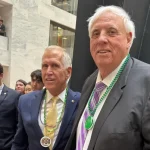

Biden’s legacy protections
President Joe Biden hasn’t spent the last 3 1/2 years expecting to spend his last six months in office scrambling to protect his legacy. Until three weeks ago, he was confident he was returning as his party’s standard-bearer and appeared confident in his ability to defeat former President Donald Trump again.
The ground has shifted, and while Vice President Kamala Harris has enjoyed a wave of excitement, buoyed by her announcement yesterday that she selected left-wing favorite Gov. Tim Walz (D-MN) as her running mate, the Biden administration is covering its bases to protect against a Trump overhaul in case he wins in November.
There is only so much power a former president can flex over his successor. Of course, that authority goes up when one man is replaced by someone else from his party. But if Trump stomps his way back into the White House, Biden and Co. are worried he will systematically tear down the apparatus of government.
This week, we are examining how the Biden administration is taking proactive steps to insulate employees, institutions, and operations from a second Trump term. This morning, Senior Investigations Reporter Barnini Chakraborty took a look at how the government, from the White House to Congress, is working to “Trump-proof” science.
Most of what happened in Trump’s first three years as president was wiped out by the chaotic, fatal, scrambling events of 2020 and the scourge of the COVID-19 pandemic. The once-in-a-generation virus wiped out more than 1 million people in the United States alone. We all tuned into erratic presidential press conferences that swung from dire warnings to statements of encouragement that we just needed to get through the next two weeks and the spread would stop.
As weeks dragged into months, a feeling of disdain began to creep in, and there was a loss of trust in institutions, in large part led by Trump and his feud with Dr. Anthony Fauci, who was the country’s leading expert on infectious diseases and director of the National Institute of Allergy and Infectious Diseases.
Fights between the president and Fauci spooked scientists and put them on guard about what another Trump term could mean for their careers and research.
Jennifer Jones, director of the Center for Science and Democracy at the Union of Concerned Scientists, told Barnini that while “there is always an urgent need to defend science,” there was an uptick in dissatisfied scientists during the previous administration.
“I just can’t stress enough how our daily lives depend on good, independent science, free of political interference,” she said.
Pushing back on “political interference” can happen in several different ways.
One effort that stretches beyond protections for scientists and doctors is to fight the “Schedule F” classification Trump tried to institute on his way out. The executive order would have reclassified thousands of government officials and employees in a way that would allow him, as the president, to fire them directly. Skeptics of the plan warned it would lead to tens of thousands of people being fired if they stepped out of line or showed disloyalty to the president.
The executive order was tossed out by Biden, but there is a concern among scientists that a second Trump term would begin with a codified version of the executive order.
Click here to read more about how the Biden administration is trying to “Trump-proof” science.
About last night
Primaries after Super Tuesday don’t always feel electric. If you aren’t going out to cast a ballot, it’s easy to forget that races to determine November contests other than the White House are still playing out and have major implications on what the country will look like in January.
The entire House of Representatives is due for a shakeup, and control of the Senate is coming down to roughly seven states where Republicans are going on offense. Even in races that aren’t set to be competitive in the general election can rattle the way House and Senate leaders are preparing to govern their coalitions.
Missouri, Washington, Michigan, and Kansas held primary contests last night, and the results told us a little more about what 2025 is going to look like. Here are three results you will want to catch up on.
‘Squad’ squashed
Rep. Cori Bush (D-MO) joined Rep. Jamaal Bowman (D-NY) as the second “Squad” member to lose a primary contest this year. The hard-left Bush had been swimming against the tide with St. Louis County Prosecuting Attorney Wesley Bell telling voters they could have all of her progressive economic policies without the headache of her anti-Israel views if they sent him to Congress instead.
Bush had a tough hill to climb even if she wasn’t the target of millions of dollars in spending from the American Israel Public Affairs Committee and its PAC spending $8 million to support Bell. She has made waves with her criticisms of Israel before and during its war with Hamas. But she was in trouble with voters for plenty of other reasons, too.
Bell beat Bush by about 5 points in unofficial returns last night. Missouri’s 1st Congressional District is rated solid Democratic by the nonpartisan Cook Political Report, meaning Bell will likely cruise to victory in November.
Washington washes its gubernatorial slate clean
Gov. Jay Inslee (D-WA) is the longest-serving governor in the country and has been at the helm in Washington state since 2013. He announced he wasn’t going to run for reelection last year, giving Republicans a spark of hope they could wrest control of the state back from Democrats.
Washington hasn’t had a GOP governor in nearly 40 years, but former Rep. Dave Reichert, a Republican, is going to try to end that run when he faces off against Attorney General Bob Ferguson in November.
Ferguson ran away with the win Tuesday night, raking in roughly 47% of the vote in an open primary that had dozens of candidates. Reichert picked up about 27% — far off Ferguson’s pace but well ahead of the third-place winner, who had 9%. The top two vote-getters move on to the general election in November.
Inslee has made a name for himself as a climate warrior who tried to run for president in 2020 on the strength of his resume on the subject.
Michigan blowout
Republicans didn’t think they had much of a chance of flipping a Senate seat in Michigan as long as Sen. Debbie Stabenow (D-MI) was occupying it. Like the governor’s mansion in Washington, though, a looming retirement gave the GOP hope it could make a play for a seat it hasn’t held since 2001.
Tuesday night’s contest cemented what November’s battle will look like.
Former Rep. Mike Rogers trounced the Republican field, hoovering up 70% of the vote when just 6% of votes were tallied. Former Rep. Justin Amash, who was a Republican before he left the party to become a libertarian and returned so he could run in the primary, was a far-off second place with 12% of the vote.
As expected, Rep. Elissa Slotkin (D-MI) cruised to victory over Hill Harper with 75% of the vote.
Forecasters project the margin of victory in November to be as small as they were wide on Tuesday. Slotkin and Rogers are known entities in the state, though neither has run a statewide campaign, which could open them up to new vulnerabilities.
Slotkin has a minor edge in polling and a huge jump in fundraising. Rogers has done fine for himself, bringing in $5.4 million, but is trailing behind Slotkin’s powerhouse figure of $24 million.
New from us
Harris-Walz is the most radical ticket in American history
Tim Walz’s complicated record on crime comes back to haunt him
Minnesota’s Walz seeks to take on ‘Scranton Joe’ mantle in the Midwest
Kamala Harris donated last year to defund police group backing DC ‘sanctuary city’ law
Josh Hawley turns once-blue Missouri Senate seat into ruby-red refuge
Pennsylvania Democrats warm to Walz after Shapiro VP snub
In case you missed it
Nancy Pelosi is spilling secrets
Trump is dancing around a debate but is sitting down for an interview with Elon Musk
Andy Ogles is a little harder to get a hold of when he’s out of the office
For your radar
Biden doesn’t have anything on his public schedule.
White House press secretary Karine Jean-Pierre will hold a press briefing at 2 p.m.
Harris will travel to Eau Claire, Wisconsin, for a campaign event at 2:20 p.m. and to Detroit, Michigan, for a campaign event at 6:40 p.m.





